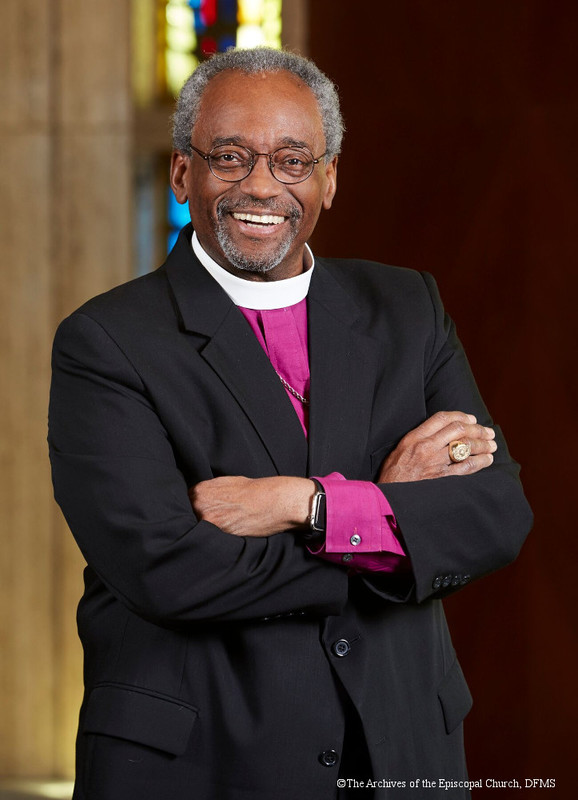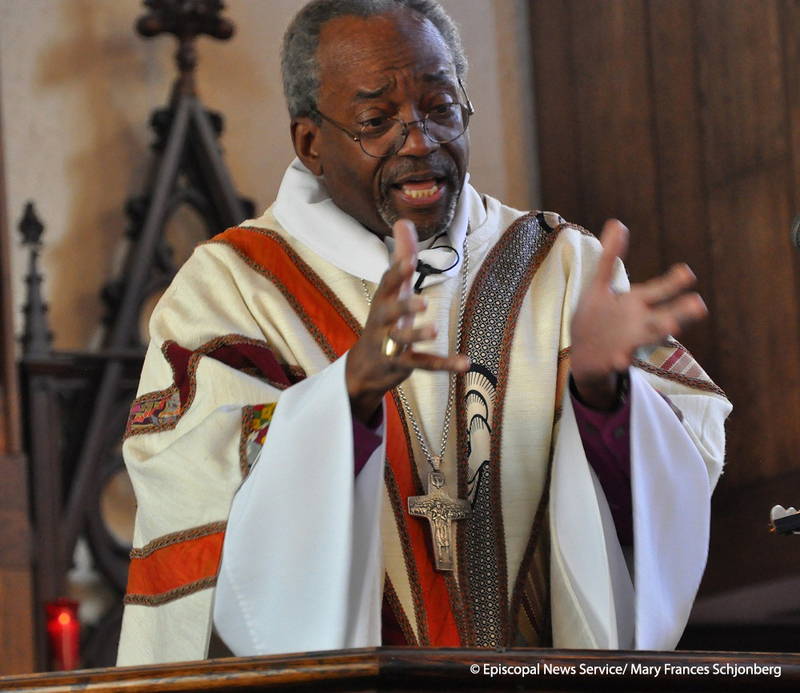Leadership Gallery
The Right Reverend Michael Bruce Curry, 1953-
Bishop Curry was elected Presiding Bishop by the 2015 General Convention, winning on the first ballot. He is the first African American to lead the Episcopal Church in its 230-year history.
Michael Bruce Curry, the first African American to be elected Presiding Bishop of The Episcopal Church, is an author, preacher, and activist, noted for his inspiring and galvanizing preaching style and his profound concern for social justice. His historic election at the 2015 General Convention reflected the commitment of many in the Church to the serious soul-searching and evangelical renewal that Bishop Curry has named in his sermons as the difficult work of transforming the world “from our nightmare into God’s dream.”
Curry was born in Chicago, Illinois, in 1953, to the Rev. Kenneth and Mrs. Dorothy Curry. His father, born a Baptist and raised in Ohio, joined the Episcopal Church in the late 1940s after attending Eucharist with Dorothy, who was an Episcopalian. Southern Ohio was still starkly segregated at that time, and the experience of the entire congregation sharing the same communion cup without regard to race impressed him deeply. Kenneth became an Episcopal priest in 1953. In 1956 he accepted the rectorship of St. Philip's in Buffalo, NY, where the couple raised their children to be active both in the Episcopal faith and in the struggle for civil rights. Bishop Curry remains faithful to Buffalo as his hometown, as evidenced most clearly by his avid dedication to the Buffalo Bills.
Michael Curry was graduated from Hobart College in 1975 with high honors and earned his Masters of Divinity from Yale Divinity School in 1978. In June of that same year he was ordained a deacon, and was elevated to the priesthood in December by the Church’s first African American diocesan bishop, John Burgess of Massachusetts. From 1978 to 1982 he was rector of St. Stephen’s Episcopal Church in Winston-Salem, NC. In 1982 he was called to be rector of St. Simon of Cyrene in Cincinnati, OH, where he served until 1988, also acting as Chaplain at the Bethany School beginning in 1984.
In 1988 Curry became the rector of the third oldest historically African-American parish in the country, St. James in Baltimore, where he stayed until 2000. In an interview with the New York Times, Curry credited his time at St. James, which coincided with the AIDS crisis, for the growth of his understanding of “the interconnections between...patterns of exclusion across a lot of different lines– race, gender, class.”
Bishop Curry is known for his powerful and charismatic preaching, combining his deep theological learning with a passionate commitment to bringing Christ's message to life. Photo courtesy of the Episcopal News Service/Mary Frances Schjonberg.
Having grown up in the Civil Rights era, Curry's work was grounded in the words of his father: “God didn’t make anybody to be a second-class citizen. Of this country, or the human family.” Eliminating barriers to loving inclusion would become a central focus of Curry’s ministry. As Bishop of North Carolina, to which he was consecrated in February 2000, Curry was known nationally as a strong proponent of gay rights and an advocate for racial reconciliation. He has refused to condemn those who disagree with him, however, particularly those members of the global Anglican Communion who voted to sanction the Episcopal Church over its decision to bless same-sex marriages. He has held firm to the belief that “this love of God is big enough to embrace all of us, and even embrace us in our disagreements.
With his election in 2015 as Presiding Bishop of The Episcopal Church by General Convention, Bishop Curry issued a call to the Episcopal Church to transform itself into “the Episcopal branch of the Jesus Movement.” The phrase captures a desire to strip away divisive and sectarian ideas and return the focus of Episcopal believers to the living example of Jesus, “seeking every day to love God with our whole heart, mind and soul, and to love our neighbors as ourselves.” The Church has embraced three unifying priorities of the Jesus Movement: evangelism, care of God’s creation, and reconciliation. As Bishop Curry states, the goal of the Jesus Movement is to effect “reconciliation – beginning with racial reconciliation...across the borders and boundaries that divide the human family of God. This is difficult work. But we can do it. It’s about listening and sharing. It’s about God.”
Michael Curry is the author of Crazy Christians: A Call to Follow Jesus (2013) and Songs My Grandma Sang (2015). He married Sharon Clement in 1981. Bishop and Mrs. Curry have two daughters, Rachel and Elizabeth. [Sources]



